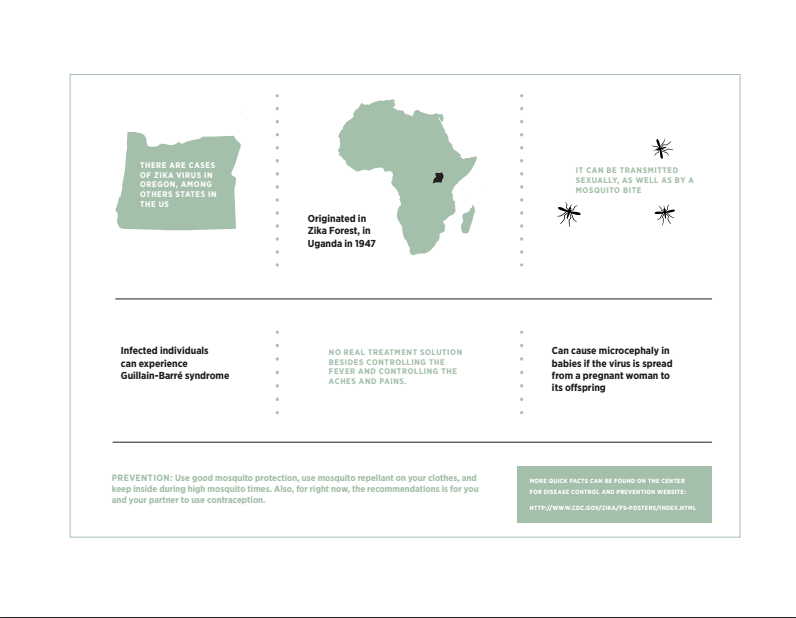The Vanguard sat down with The Center for Student Health and Counseling’s Medical Director, Dr. Mark Bajorek on March 4 to discuss the ongoing effects and spread of the Zika virus.
Bajorek issued a press release via mass e-mail to all PSU students encouraging those traveling to warmer climates to protect themselves from possible Zika infection.
The Zika virus, of which there are multiple cases of infection in Oregon, is primarily spread by mosquitos or is contracted sexually. The rapid spread of this virus is concerning because it is associated with Guillain-Barré syndrome, a disorder that causes temporary paralysis and several birth defects (i.e.: microcephaly, a condition in which a baby is born with a significantly smaller brain than expected).
Keisha Muia: Who does the Zika virus mainly affect? Are young people a main demographic?
Dr. Mark Bajorek: Definitely there are young people that can be affected; college age folks can be affected by the virus. The viral infection is directly associated with Guillain-Barré syndrome, [and] medical science is still sorting out if the Zika virus is mainly responsible for cases of microcephaly. But some folks are also wondering if it’s some other chemicals that had been added to the water in certain communities that are causing this degree of microcephaly.
KM: When did the first major outbreak occur?
MB: It could have been for a while, and we’re just now doing the testing.
KM: What are the major medical effects of Zika infection?
MB: Sometimes it’s just a rash, and a lot of the people just don’t show any symptoms whatsoever.
KM: Can you explain the complications associated with Guillain-Barré syndrome?
MB: Guillain-Barré is a neurological disorder where [people] start losing both sensory and motor control in the lower extremities, and it kind of works its way up.
KM: So it’s a debilitating disorder like Parkinson’s disease?
MB: It’s kind of its own deal. Inflammation in the spine, and then it starts to work its way up until it keeps people from breathing.
KM: If infected, how treatable would the Zika virus be?
MB: I understand [that] the fevers are treated with an acetaminophen, Tylenol or Advil…[In regards to] Guillain-Barré, it really depends on the level of nerve injury; whether somebody needs to be observed, hospitalized, or put on a ventilator.
KM: Why do you think Zika is spreading so quickly?
MB: What I know about influenza, or influenza-like viruses, is that it’s almost a logarithmic effect, where you get a cohort of people and based on that it just really starts to get elevated.
KM: In your opinion, do you think Zika could become a pandemic?
MB: With Zika right now there are so many different efforts around controlling and managing mosquitoes, that the transmission patterns would be highly erratic.
KM: Are there researchers currently working on a vaccination? If so, when can we predict they would be available for the general public?
MB: I’ve heard that folks are working on it, but I don’t know when it would be available. There are some very clear protocols around identifying markers, and then strategies around testing new vaccines. For Zika, it still has to go through that process.
KM: What are some safety measures you think students can take to prevent Zika infection?
MB: [Everyone should] use good mosquito protection, keep themselves inside during high mosquito times…use contraception if you’re in that area…and also make sure that your partner, if they’ve been exposed, uses a condom.
KM: Can you offer some possible solutions for Zika?
MB: Before you travel, it’s a good idea to visit the CDC’s website so that you’re aware of what some of the risks are, what types of repellants are there, and what type of shots are necessary. And then look at the risks and benefits of exposures…the risk of getting a mosquito borne illness or not. If there are extenuating circumstances, like a pregnancy, or the possibility of pregnancy in the next year or two that would weigh in the decision making about traveling.





